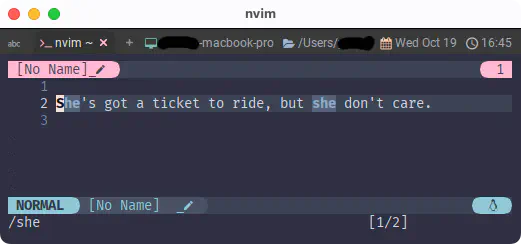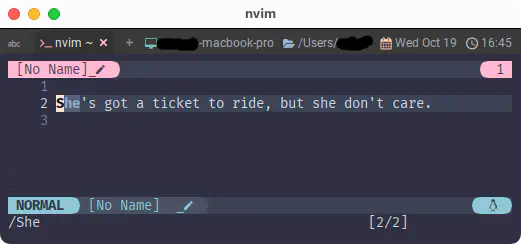ignorecase / smartcase
この2つは検索に関するオプションなのでまとめていっちゃいます😆
7. Ignoring case in a pattern /ignorecase
If the 'ignorecase' option is on, the case of normal letters is ignored.
'smartcase' can be set to ignore case when the pattern contains lowercase
letters only.
ignorecase' オプションがオンの場合、通常の文字の大文字小文字は無視される。
smartcase' を指定すると、パターンが小文字のみである場合に大文字小文字を無視する。
Examples:
pattern 'ignorecase' 'smartcase' matches
foo off - foo
foo on - foo Foo FOO
Foo on off foo Foo FOO
Foo on on Foo
\cfoo - - foo Foo FOO
foo\C - - foo
'smartcase' 'scs' boolean (default off)
global
Override the 'ignorecase' option if the search pattern contains upper
case characters. Only used when the search pattern is typed and
'ignorecase' option is on.
検索パターンが大文字を含む場合、'ignorecase' オプションを無効にする。
検索パターンが入力され、'ignorecase' が on の時のみ使用される。
これは実際に動かしてみましょう😉 まずは以下の文章を入れてみて下さい。
「彼女がおれのことなんて気にも留めずに行っちゃうよ!」…っていう
Ticket to Rideの一節です。
それでは小文字だけのsheを検索してみます。検索には/で入れます。
/she

Sheとsheの2つに反応しましたね。
じゃあ、次は 「大文字を含む場合」のSheでやってみましょう。
/She

Sheだけに反応しましたね。
要は、「大文字が含まれていれば大小区別するけど、含まれてないなら大小無視します。」っていう設定をしたんです。